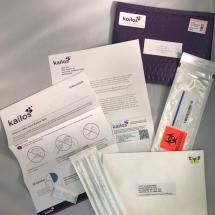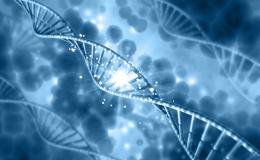The Utility of Hereditary Cancer Screening
Lynch syndrome is a heritable cancer syndrome caused by variations in genes that are responsible for repairing errors in DNA. People with Lynch syndrome are at higher risk for developing many types of cancer, including cancers of the colon, rectum, stomach, small bowel, ovaries and the uterus.

It is estimated that as many as one in 300 people carry a variation, or mutation, in one of the five genes associated with Lynch syndrome. Lynch syndrome is passed generationally in an “autosomal dominant” pattern. This means that a child only needs to inherit one copy, rather than two copies, of a gene mutation to have an increased risk of developing Lynch syndrome. Statistically speaking, a child who has a parent with a Lynch syndrome gene mutation has a 50% chance of inheriting that mutation. Any sibling or parent of a person who has a Lynch syndrome mutation also has a 50% chance of having the same mutation.1 Individuals with a strong family history of colorectal and/or endometrial cancer, particularly on one side of the family, may be good candidates for screening of the genes currently known to be associated with Lynch syndrome: MLH1, MSH2, MSH6, PMS2 and EPCAM.
As an example, a 52-year-old woman, Anita2, was admitted for inpatient surgery to remove a lesion found during a colonoscopy two weeks earlier. A biopsy of the lesion confirmed colon cancer.3 Anita had no other history of significant illness, however, she had a strong family history of colon cancer: her mother and both of her siblings had been diagnosed with colon cancer. Anita’s mother had been diagnosed twice with colon cancer in different areas at ages 54 and 61, and her sister was also diagnosed twice with cancer, once at age 54 with endometrial cancer and once at age 61 with colon cancer. Anita’s brother was diagnosed with colon cancer at age 57. She was referred to a genetic counselor and sent for genetic testing for suspected Lynch syndrome. Using sequencing technology similar to that used with the Kailos Genetics ExpedioTM hereditary cancer screen, a mutation in Anita’s MLH1 gene was discovered, confirming her Lynch syndrome diagnosis. Anita’s clinicians recommended her siblings undergo genetic screening for the same Lynch syndrome mutation. Both her brother and sister were found to have the same gene mutation and both were diagnosed with Lynch syndrome. The presence of the same gene mutation in all three siblings established that the mutation was almost certainly inherited from the siblings’ mother, and subsequently, all of the children of the three siblings were tested for the same Lynch syndrome mutation.
Ultimately, the Lynch syndrome mutation inherited by Anita and her two siblings was only passed to Anita’s son, who had no symptoms when the genetic testing was performed. As a precaution, a colonoscopy was performed on Antia’s son that revealed abnormal and inflamed intestinal tissue. A preventative treatment of aspirin was prescribed and a six-month follow-up colonoscopy showed improvement of the affected tissue. Because of his increased risk of developing cancer, Anita’s son’s clinicians developed a preventative care plan designed to increase the surveillance and screening of Lynch syndrome-associated cancers. He will undergo a colonoscopy and urine test once a year and a gastroscopy every three to five years after the age of 35.
Our case study underscores the potential of hereditary cancer screening to significantly improve an individual’s future quality of life and save lives. Kailos Genetics utilizes next generation sequencing technology to screen for mutations in the 33 different genes of our proprietary Expedio hereditary cancer screening test, including the five genes associated with Lynch syndrome. The results of the panel are delivered in about two weeks and give you and your physician actionable information about your genes, enabling your physician to more accurately assess your cancer risk and precisely monitor your health.

We collect your DNA from an oral swab collection kit you can perform yourself at home, making testing simple, easy and painless. At Kailos Genetics, we empower patients and their physicians to make personalized healthcare possible.




